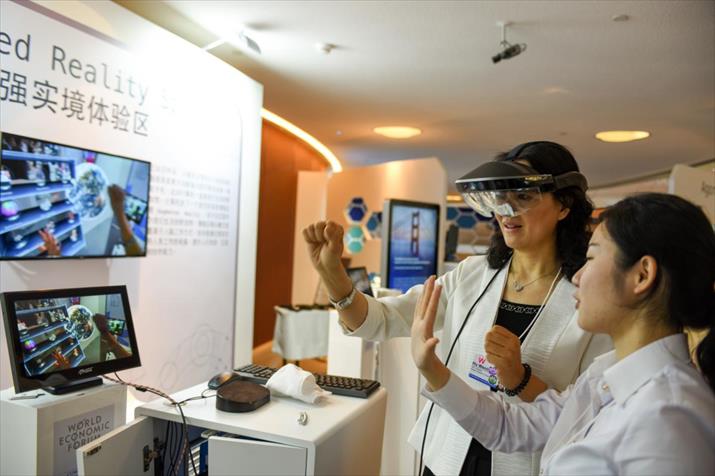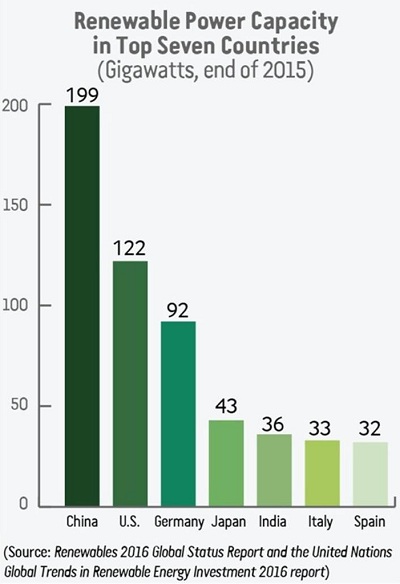|
||||||||||
| Home Nation World Business Opinion Lifestyle ChinAfrica Multimedia Columnists Documents Special Reports |
|
||||||||||
| Home Nation World Business Opinion Lifestyle ChinAfrica Multimedia Columnists Documents Special Reports |
| Business |
| Driving a Sci-Tech Revolution |
| The Summer Davos focuses on the path to inclusive growth |
| By Li Fangfang | VOL.9 August 2017 ·2017-08-04 |

ALTHOUGH the theme of the 2017 Summer
Davos, or the 11th Annual Meeting of the New Champions, focused on Achieving Inclusive Growth in the Fourth Industrial Revolution, it was more than a discussion on science and technology.
"It's a dialogue of human values," said Jean Liu, President of Xiaoju Science and Technology Ltd., which owns the Chinese leading ride-hailing app Didi Chuxing. She was one of the co-chairs of the annual meeting held on June 27-29 in Dalian, northeast China's Liaoning Province.
The rapid development of artificial intelligence (AI) has triggered numerous debates on the impact of technology on humans. At the same time, the world has also witnessed breakthroughs in the fields of advanced robotics, drones, and virtual, augmented and mixed reality systems, as well as biotechnology, new materials and so on. All of this contributes to the creation of the Fourth Industrial Revolution that is founded on the digital technologies from the Third Industrial Revolution, according to the report Advancing Human-Centered Economic Progress in the Fourth Industrial Revolution published by the World Economic Forum on June 22.
"The technological changes that we've seen coming are exponential in their development. We really have the risk of creating more disunity, displacing jobs, creating more polarization and division within society," David Aikman, Chief Representative Officer with World Economic Forum Representative Office, told ChinAfrica. "The challenge for the Earth that we want to discuss in Dalian is how we can make technology more human-centered, how we can include the individual and our society as a part of that technology and find ways to use technology to create a more inclusive society."
At the event, Chinese Premier Li Keqiang said that the world can make use of growing stability amid innovation and change to defeat uncertainty as long as a firm and indomitable spirit is maintained. "The industrial revolution is giving birth to new industries, business models and technologies. Never before have we human beings been presented with so many opportunities for development," said Li, addressing the opening ceremony.
Pioneering sharing economy
The sharing economy has become increasingly popular in China, as more and more people seek to make their lives easier and save resources, creating large numbers of jobs. It has become part of Chinese people's lifestyles ever since the car-sharing service started flourishing in recent years.
"The transportation 3.0 era has come," Liu said. She noted that there will be three main changes in the future of the industry - the super car-sharing, intelligent driving and AI will completely solve the problem of traffic congestion; in addition, the intelligent driving will massively lower the accident rate; and the use of electric vehicles will make tail gas disappear.
Meanwhile, bike-sharing businesses also provide solutions. "Bike-sharing not only alleviates congestion but also changes city residents' means of transportation," said Dai Wei, founder and CEO of Ofo, a bike-sharing service provider.
From the point of view of regulatory authorities, adapting to these new trends is also a challenge.
The State Council, China's cabinet, announced a decision to facilitate the healthy development of the sharing economy. According to a State Council Executive Meeting chaired by Premier Li on June 21, entrepreneurs are encouraged to explore the sharing economy, while the authorities should adjust administrative approval and business registration procedures in accordance with new business models.
"The Chinese Government is the first to legalize the car-hailing service in the world. It's a great step," Liu said. "However, the concept of trip-sharing is still fresh and changing - if the regulator can have a more inclusive attitude and perception of sharing economy, that will be better."

Clean tech functioning
"With a smartphone in hand, you can find a bike anywhere in Beijing," said Wan Gang, Minister of Science and Technology, in a session of the forum on June 27.
Two decades ago, China was seen as a kingdom of bicycles, which possibly suggested that China was undeveloped. But today's bicycles are embedded with different hi-tech devices, including satellite navigation, mobile payment, big data and cloud computing.
Bikes and electric cars represent a green lifestyle, and they are related to the clean technology revolution, Wan noted. Electric car sales in China totaled 507,000 in 2016, the highest in the world. Still, regarding the development of electric cars, battery charging is a paramount issue.
"The State Grid is trying to solve this problem," said Shu Yinbiao, Chairman of China's State Grid Corp., a Fortune 500 company and one of China's biggest employers. The development of electric cars is a big step in clean technology since globally over 20 percent of energy is consumed in the transportation sector, he added.
The State Grid has established an online platform of electric cars in which charging piles and cars are monitored in real time. Since the data can be shared among different charging piles, emergencies can be solved rapidly based on the car's specific problems. Currently, 160,000 charging piles and 1 million electric cars in 95 cities in 13 provinces are involved in the project.
"It is fair to say that we are leading in clean technology development," Wan said. "Technology innovation goes hand in hand with innovation of institutional arrangements." Investment in innovation is a crucial factor in driving growth, he asserted while emphasizing the need for more flexible policies.
China aspires to change its traditional energy mix so that renewable energy could account for 50 percent or more of the total consumption.
Beijing closed its last coal-fired power plant in March. The Beijing-Tianjin-Hebei region will not need coal for heating by the end of the year.
The future ahead
China endeavors to adapt to the latest global technology and industrial revolution, push forward the sharing economy, strive for optimal allocation of resources, reduce overcapacity and foster growth momentum, according to the State Council Executive Meeting in late June.
Premier Li mentioned in his speech at the 2017 Summer Davos that China will further expand market access in the service and manufacturing sectors, relax restrictions on foreign ownership, and treat domestic and foreign companies on an equal basis.
China's adaptive governance is welcomed by business leaders. More than 90 percent of Chinese CEOs are confident in the growth outlook of their companies, a higher percentage than their global counterparts, according to a KPMG CEO survey, titled 2017 China CEO Outlook - Disrupt and Grow, published on June 27. The survey gathered responses from 1,261 CEOs worldwide, including 125 from China.
It shows that over the next three years, two thirds of Chinese CEOs are predicting top-line growth of 2 percent or more, while over the next year, 97 percent plan to increase their headcount, both ahead of their global peers.
KPMG China Chairman Benny Liu said that China's restructuring process and increasingly sophisticated consumers are leading to both challenges and opportunities. CEOs are responding to this by embracing technological disruption to innovate their production and distribution models, as well as to create new products.
"The process of China's continued reform and opening up needs participation from foreign capital, foreign businesspersons and foreign wisdom," Premier Li said. "We welcome foreign businesses to carry out mergers, acquisitions and reorganizations in China. China will further expand market access for them, apply the negative list approach and treat them the same way as domestic firms."
(Reporting from Dalian, Liaoning Province)
|
||||
| About Us | Contact Us | Advertise with Us | Subscribe |
| Copyright Beijing Review All rights reserved 京ICP备08005356号-5 京公网安备110102005860号 |